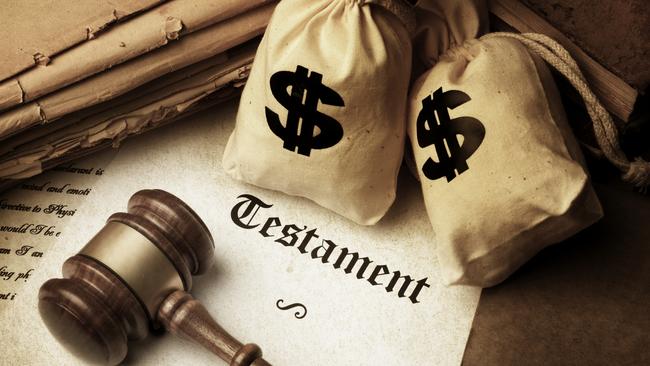Barefoot Investor: Don’t waste time or energy betting on crypto
Our younger years are when we really need to focus on the hustle — so invest in skills that will pay dividends and don’t rely on crypto.
Barefoot Investor
Don't miss out on the headlines from Barefoot Investor. Followed categories will be added to My News.
On Saturday night I was watching Herbie: Fully Loaded with the kids.
That’s the one starring Lindsay Lohan, when she was still sweet and innocent and doing Disney. It’s a terrible movie.
So, while the kids munched on popcorn, I fired up my laptop and began looking through reader questions.
A new email pinged ... with the subject line “SOS – help me Scott”.
Scott, I should have listened, I read your articles about crypto and I sold mine before the rise. Then I got FOMO and invested $18,000. Now it has dropped … MASSIVELY. I’m down $10,000. What do I do? I want to sell but I don’t want to lose my money. Seriously. I’m 22 and just quit my job!
Ben
Hang on a minute.
Of all the things a 22-year-old bloke could (or perhaps should) be doing on a Saturday night ... he’s sending a daggy dad a question on crypto?
Herbie goes bananas!

Still, Saturday night was a knife fight for crypto: some coins were slashed by half.
(However – and this is important – it was simply a marker in time. Since Ben sent the email,
Bitcoin has rallied 25 per cent, and Etherium 50 per cent, so maybe he made his money back?)
In any event, I do have some advice for you, Ben: STOP WASTING YOUR TIME.
See, Ben, you’ve got two things most people don’t have enough of:
Time ... and energy.
Now, you can waste that time betting on things you have no control over (like crypto) ... or you can invest it in skills and habits that will compound for the rest of your life.
That could be finding a mentor, starting a side business, getting fit, or even just reading some good books (my pick: Extraordinary Popular Delusions and the Madness of Crowds – no talk of crypto, though, it was published in 1841).
In other words, anything that you master now will compound over your life and make things exponentially better.
When you’re 22, you think you’ll always be young and that you’ve got plenty of time to get around to all that stuff. However, I reckon you have just 10, maybe 15, years to really focus on the hustle.
After that, your time and a lot of your energy will likely be diverted by a partner, kids, a mortgage.
I don’t want to scare you, Ben, but one day you’re going to wake up.
You’ll have three kids on your lap, popcorn in your pants ... and you’ll be watching Lindsay Lohan pretending to talk to a car.
Beep, beep!
Tread Your Own Path!
HOW TO EARN 3 PER CENT ON YOUR SAVINGS
Hi Scott
There’s a new app called Blossom that just has popped up. It’s still in the testing phase, but my fiance has been invited to test it out. It’s targeting 3 per cent returns on savings, and you can deposit and withdraw money at any time without any fees. It’s apparently a fixed-income investment without the restrictions of being locked in long term, like with other investments, and it’s backed by JP Morgan. It almost feels like an external high-interest-earning savings account. In the current climate of very little interest earnings on other normally high-interest-earning savings accounts, this all sounds very appealing for parking your savings in. So ... what’s the catch?
Cheers, Belle
Hi Belle,
I took a look at Blossom and it has a very Gwyneth Paltrow candle-like vibe to it:
“Plant the seeds and watch your savings Blossom each day,” whispers the pastel-coloured website.
In fact, the only thing I think you’ve planted, Belle, is this question.
Level with me: you work for Blossom, right?
After all, what sort of reader says, “it almost sounds like an external high-interest-earning savings account”?
Anyway, the catch with Blossom is that you are not protected by the government deposit guarantee (of up to $250,000). In other words: if things go bad, you could lose your money.
Will they go bad? I have no idea. Generally, fixed-income investments are quite secure.
Still, the fact is that you’re taking on more risk, which is why they’re targeting a higher rate of return.
And that’s the rub: while they’re targeting a 3 per cent return (after their fees), that’s not guaranteed.
So the question you need to ask yourself is a simple but important one:
“Am I willing to take the extra risk to earn at best an extra 1.5 per cent per annum?”
Personally, I’m not. It’s just not enough of a return to justify leaving the warm embrace of the government.

OUR $2 MILLION BATTLE
Hi Scott,
Last year I cared for a very close family member, who sadly passed away in December. I’ve been included in his will and expect to inherit approximately $2 million. Besides the grieving, we’re trying to deal with the fact that other very close family members were NOT included in the will. We are a tight-knit family and I would like to share some of this inheritance with them. Where on earth do I start, not only setting my little family up for life but also possibly helping other family members financially?
Janice
Hi Janice,
Let me start by saying that you didn’t receive this money by mistake: it was clearly what they wanted.
Case closed, right?
Well, maybe not.
In these situations the will may (read: probably will) be contested by close family members who got doughnuts.
There’s a six-month window to challenge a will – after that, they can only do so with a court’s permission.
If I were in your shoes I’d apply for probate as soon as possible (which basically means proving the will is valid and the executor can distribute the estate to the beneficiaries), and then mark the date on your calendar.
Only then would I start thinking about what to do with the money.
The first meeting should be with your accountant, to see how much capital gains tax the assets could be up for.
As for dishing out the dough: I’d follow the Barefoot Steps so that your own family is cared for and financially secure, and then think about what to do with the rest.
Good luck!
Timeshare Win!
Dear Scott
I am reaching out to you after reading your question from a reader last week on our timeshare club. There may be some confusion here as to how our club operates, as we never intentionally wish to cause distress to any one of our members and always try to assist where possible. I would like to contact the people who wrote to you (Julie and David) so I can personally help resolve their concerns.
Sharon, Accor Vacation Club
Hi Sharon,
Julie and David admit they got cornered by the hard-sell at your timeshare seminar in 1997.
However, they’re not shirkers: David admitted to me: “It’s our bloody fault!”
Yes, I said to David, you got pressured into making a bad financial decision that cost you $22,000 upfront.
Yet to be locked into paying a grand each year for something you won’t use, you can’t afford and you can’t get out of seems kind of ... well ... outrageous to me.
So much so that I decided to take this case on myself.
It seemed like an easy case for the Australian Financial Complaints Authority: Julie and David were pressured into an unfair contract.
They’re now pensioners, selling off assets to make these payments they can’t afford.
However, I’m appreciative that Accor Vacation Club has decided to let Julie and David exit the club and not be liable for any further payments.
Having an extra $1000 a year will have a huge and meaningful impact on their lives.
Thank you.
Information and opinions provided in this column are general in nature and have been prepared for educational purposes only. Always seek personal financial advice tailored to your specific needs before making financial and investment decisions
The Barefoot Investor for Families: The Only Kids’ Money Guide You’ll Ever Need
(HarperCollins) RRP $29.99
Originally published as Barefoot Investor: Don’t waste time or energy betting on crypto


